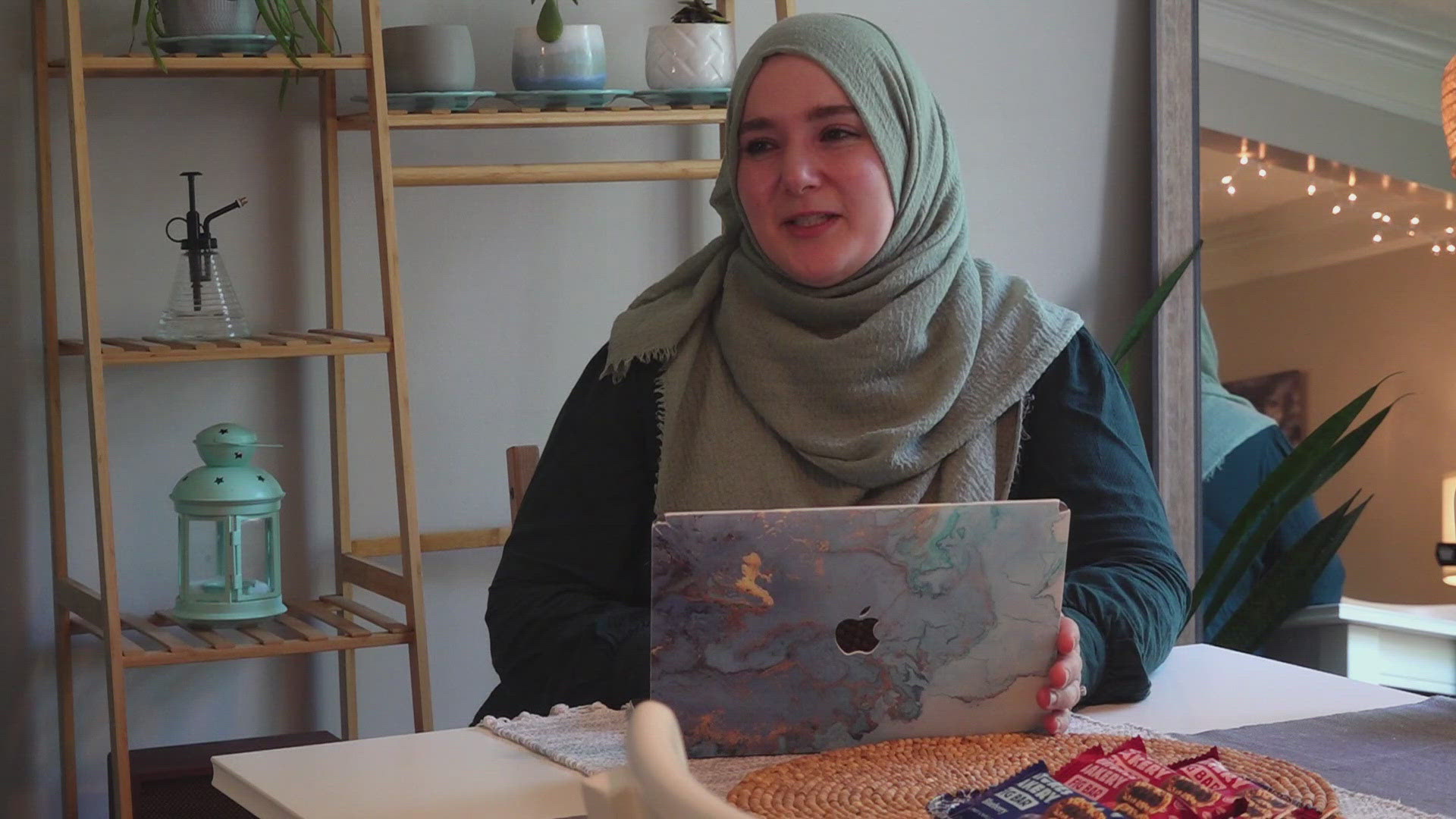KNOXVILLE, Tenn. — For several weeks, the People's School for Gaza has met at the University of Tennessee. There, people organized discussions about the history of Palestine and shared the local impact of the Israel-Gaza Crisis. It also organized a vigil at the College of Law lawn for "Nakba Day."
Layla Soliz, a Knoxville resident, said she was arrested at the Nakba Day Vigil along with her husband, Zanne Soliz. The group attending the vigil was told by a UT vice chancellor they were in an unauthorized area and had 10 minutes to leave before around a dozen people in total were taken into custody.
"When we arrived at UT's campus, we realized that there were already police cars and a paddy wagon on campus surrounding the University of Tennessee Law School," said Soliz.
She said the group initially decided to gather at the sidewalk area in front of the law school building. She said it was raining at the time, and later thought it would be risky to stay on the sidewalk next to Cumberland Avenue. She said officers there told them to back away from the law school. So, the group ended up having a silent vigil on the sidewalk, she said.
Then, she said the group ended up moving again.

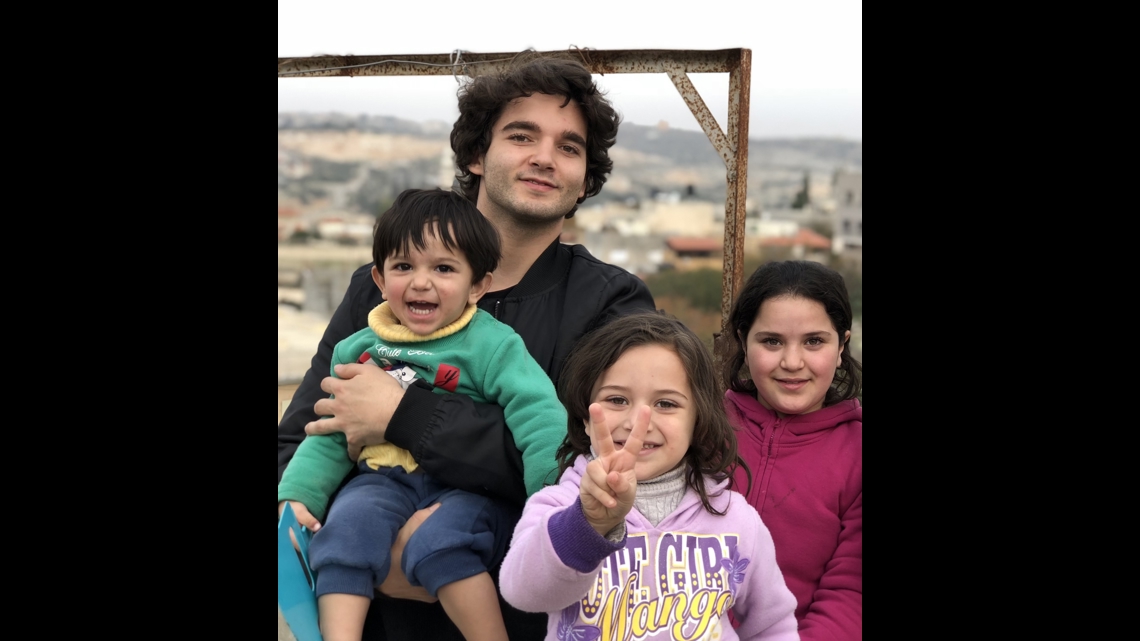
"We made one full circle kind of on that sidewalk back to the main sidewalk and back up onto that sidewalk. Without issues, we made another round. And on the second round, we decided we weren't going to stand there because we felt that, you know, we are all either UT students, UT alumni, or guests of students, which to our understanding is, you know, we have the right to be on the campus according to our understanding of UT policy," she said.
She said officers gave the group a ten-minute warning to leave, or else they would be arrested. She said the group stayed to exercise their rights.
"We go that one more one-minute warning. The lead officers gave the signal to go ahead and arrest us," she said. " "We were all put in zip ties. I think a couple of folks were put in actual handcuffs if I remember correctly. And we were walked down to the paddy wagon that was parked on Cumberland. We were loaded one by one."
The group was transferred from the custody of the University of Tennessee Police Department to the Knox County Sheriff's Office. She said they were taken to a detention center where she was told she needed to remove her hijab to be checked in. She said two female officers were able to remove it from the paddy wagon.
Soliz said her friend, Maha Ayesh, is an attorney and she was advocating for her religious rights. She says her friend advocated for her right to wear a hijab in her booking photo and was able to advocate for her to wear long sleeves with her arrestee attire.
However, a booking photo of her without a hijab was still taken and posted to the sheriff's office's inmate database.

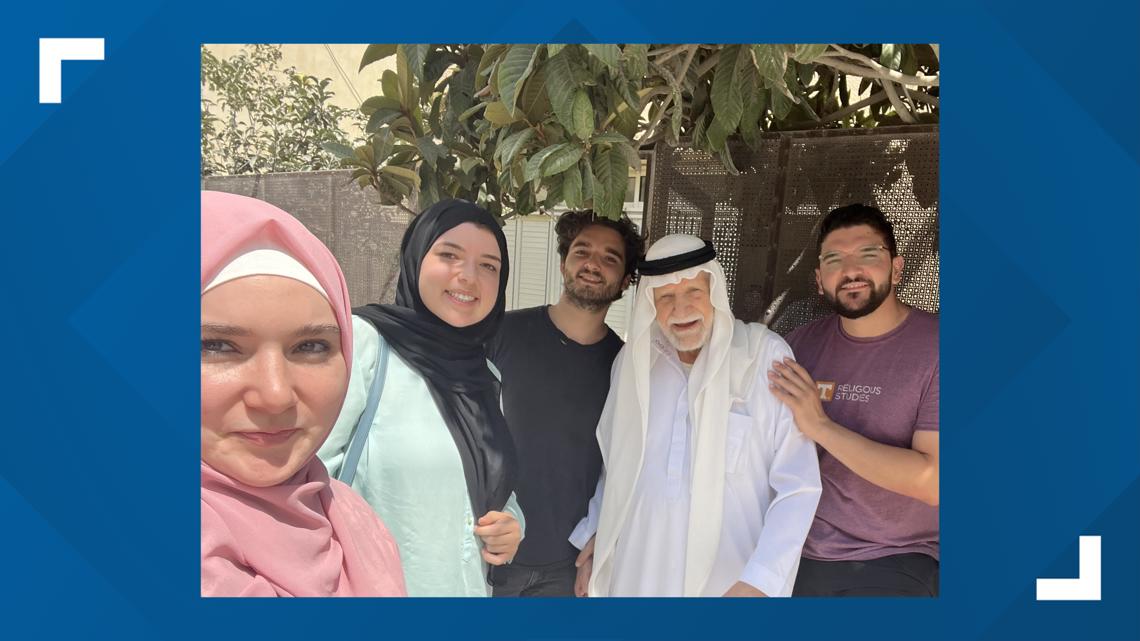
A full statement from Ayesh is available below. In it, she said authorities told her the hijab would not be removed unless there were security concerns.
"On the night of May 10, I received word that several individuals who had been attending a Nakba Day peace vigil were arrested by UTK police. One of the arrestees, Layla Husain, is a friend and is a Muslim woman who wears a hijab. Mrs. Soliz's family and I were concerned about her treatment at the Knox County Sheriff's Office detention center, where they would be booked and jailed, particularly because of past experiences of Muslim women being forced to remove their headscarves. I went to the detention center and arrived before Mrs. Soliz or the other detainees arrived or were booked, and I explained to officers that a young woman who wore a headcover for religious reasons was arrested, that she should not be forced to remove her hijab, and that they should not publish a booking photo of her without her hijab. I was not allowed to be in the booking area, but I emphasized the importance of respecting Mrs. Soliz's religious rights and that forcing her to remove her headcover and, especially, publishing a photograph of her without her headcover, would be considered a violation of her right to practice her religion. The officers I spoke with made no guarantees, but one of them told me that her headcover would only be removed in the event of a security concern. Knowing Mrs. Soliz, I knew there would be no security concerns. Later that night, despite our best efforts to educate officers and explain the importance of this issue to them, in order to avoid harm to Mrs. Soliz and potential liability on the part of the County, the Sheriff's Office did publish a booking photo of Mrs. Soliz without her hijab.
The Sheriff's deputies apparently did not follow their own policies regarding the treatment of detainees who wear religious headcovers. Although the violative photo has since been removed from the official public database and Knox County's website, it remains on the internet through third parties, causing continuing harm to Mrs. Soliz."
KCSO's identification policy said photographs are taken of arrestees with and without head coverings, but only photos with the head coverings are posted.
In KCSO's identification policy, it states there will be photographs taken of the arrestee with and without their head covering, but only the one with the head covering will be posted.
"I asked again, just (for) reassurance. Like, this will not be visible to male officers, this will not be posted online, and they confirmed that neither of those things would happen," said Soliz.
But Soliz said the wrong picture ended up being posted. She said one of her friends who was at the detention center overheard officers saying that the wrong photo was published on the booking site.
"At some point, another friend who had been arrested with us, as part of the vigil, came in and said, 'Hey, I think there's been some sort of issue with your hijab.' This person had overheard a conversation between the officers and someone in the waiting room, who was part of our group waiting for us to be released, apparently looked on the booking website and found that my picture had been posted, in fact, without hijab," she said. "And because at that point, it was just kind of a hearsay situation, I wasn't at the point of being too stressed yet, because I was like, 'Maybe it hasn't actually been published yet. Maybe there's some sort of confusion here.'"
But to Soliz's dismay, it was true.

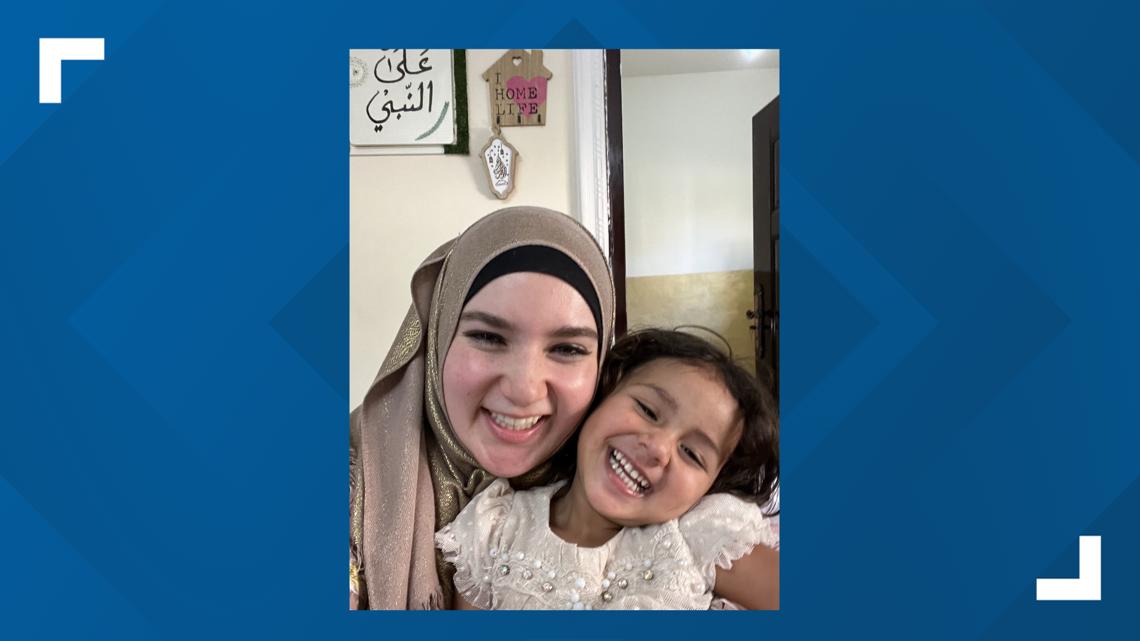
"Within the detention facility, my religious rights were then also infringed upon when my picture was posted without my hijab, again, in direct violation of both the Knox County policy and my constitutional rights," said Soliz.
For most Muslim women, wearing a hijab is a way to practice modesty. Types of hijab may differ between different Islamic sects.
"First and foremost, it's an act of my obedience to God. I believe that this is a form of modesty and a form of religious recognition that God calls on women, believing women to wear, into practice," said Soliz. "I have done my best to practice and to uphold, as I said, for many, many years. So for, suddenly, after all of those years of doing my best to keep that part of my physical self private — to suddenly now have my image without hijab posted online is just really violating and really upsetting. And, I just would hate for any other woman, Muslim or otherwise, who wears a head covering for religious reasons to have to go through a similar experience."
The Community Defense of East Tennessee organization has confirmed they are supporting Layla and will be at her court date. It is a group focused on addressing issues related to mass incarceration and advocating for justice.
A statement from that organization is available below.
"The incident where the Knox County Sheriff’s office made Layla Soliz remove her hijab and publicly posted her photo constitutes an egregious violation of her rights. Such an action infringes upon her fundamental freedoms of religion and expression, which are protected under the First Amendment of the U.S. Constitution. Forcing a woman to unveil disregards her personal dignity, religious convictions, and bodily autonomy. This act not only undermines the principles of religious tolerance and diversity but also exposes her to potential humiliation and psychological distress. The enforcement of this policy by a law agency is particularly horrendous, as it reflects a misuse of power and a lack of respect for the civil liberties that the office is sworn to protect. Immediate corrective measures and policy changes with accountability are imperative to prevent further violations and to uphold the rights and dignity of all individuals, as well as any restorative measures and compensation to accommodate Layla Soliz’s journey to healing."
Soliz said although this happened, she was thankful to have a friend at the detention center to advocate for her religious and constitutional rights.
"There are a lot of people who have had to go through the system without voices to speak for them without people to advocate on their behalf. And so, I recognize that it is a blessing and a privilege to have people who have advocated for me even before I arrived at the facility. Of course, it's unfortunate that even with the advocacy these rights were violated. But when we came out after those hours spent in jail that night, it was just really uplifting and encouraging to know that we had a lot of people there waiting for us, encouraging us, reaffirming for us that we were doing the right thing — that we did nothing wrong, that holding a vigil, calling for peace, calling for an end to the suffering of human beings in Palestine and elsewhere. Ultimately, that's what we believe is that when we stand for the justice of one people, we stand for the justice of everyone," she said.
WBIR reached out to KCSO with the following questions:
Has the Sheriff's Office issued an apology to Layla Soliz?
Is there a plan to issue an apology if one hasn't been given?
KCSO policy says the religious covering photo should be the one posted, but that didn't happen in Layla's case. Is there an investigation into why this happened?
What will be done to ensure this doesn't happen again?
As of around 7:30 p.m. Tuesday, WBIR has not heard back.
Soliz said she has a personal connection to the Israel-Hamas Crisis, and said the majority of her dad's side of the family still lives in the West Bank.

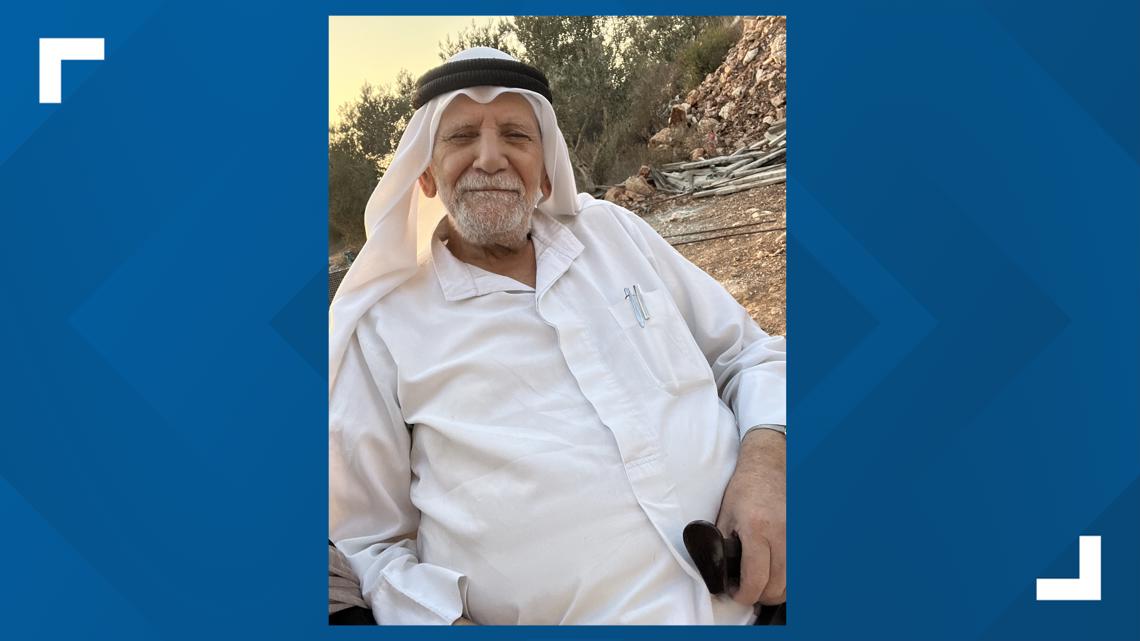
Background on the Israel-Gaza Crisis
More than 34,000 Palestinians have been killed in Gaza since Oct. 7, according to the Ministry of Health in Gaza. Israeli officials said around 1,200 people died in the Oct. 7 Hamas-led raid in Southern Israel, and some 570 Israeli soldiers have reportedly been killed since.
The ongoing Israeli offensive has also been internationally condemned, and the International Court of Justice called for Israel to prevent death and destruction after South Africa filed allegations that the country committed genocide in Gaza.
Across the U.S., protests at college campuses have also flared to show support for Palestine. At several schools nationally, police and National Guard members were called to force the demonstrations to an end.
The Oct. 7 bombing followed decades of tension, during which time the Human Rights Watch said Gazans lived in an "open-air prison." Most of the tension centers around Palestine and Gaza, an area that was divided as part of the "Nakba" — a period of displacements in the region following World War II as Israel was created.
"It remains a deeply traumatic event in their collective memory and continues to shape their struggle for justice and for their right to return to their homes," the UN said about the Nakba.
Hamas was elected to power during the mid-2000s. The United Nations said in 2019 more than half of all people in Gaza were under 18 years old, indicating they were not able to vote for Hamas when Israel declared war.
The group launched the attack on the anniversary of the Yom Kippur War — causing an initial death toll that was unseen since the 1973 war between Israel, Egypt and Syria. The day after the Oct. 7 bombing, Israel declared war against Hamas and started bombarding Gaza.
The Gaza Strip was home to millions of people. The UN said more than 70% of all housing units have been destroyed, and around 80% have been destroyed in the northern area. The UN said the entire Gazan population is facing a "severe food crisis," escalating the risk of famine and especially impacting vulnerable groups. A UN Special Rapporteur for food also said Israel "has mounted a starvation campaign."
It also said on April 30 that the region's health system was in jeopardy. Only five hospitals in northern Gaza were partially functional, and only six were operational in the southern part of the region.
It said around 86% of schools were damaged, and 72% would need at least major rehabilitation work. It also said around 1.7 million people were displaced across the Gaza Strip, with families having to move multiple times in search of safety.
Around 200 days since the start of the crisis, violence continued flaring across the region.
The UN also said Israeli settler violence was prevalent, and over two days there were 18 incidents involving Israeli settlers. It said armed settlers held Palestinian farmers at gunpoint, seized crops, and assaulted shepherds. In the Jordan Valley, the UN also said settlers entered and tore down Palestinian tents.
Since Oct. 7, Israel has cut off much access to food, water, medicine and electricity in Gaza. On May 7, Israeli forces took control of Gaza's Rafah border crossing, prompting fears of a full-scale invasion of the city after talks in Cairo of a cease-fire with Hamas without any clear agreement.
The Pentagon said a newly built U.S. pier on the Gaza Strip could lead to new deliveries of food and supplies. Trucks carrying aid rolled into the region on May 17, according to the Associated Press, and the shipment was the first in an operation that military leaders said could scale up to 150 truckloads a day.
Aid has been slow to get into Gaza, with backups of trucks waiting for Israeli inspections. The U.S. and other nations used air drops to send food into Gaza, and aid organizations said several hundred trucks of resources are needed per day to fully help the region. With the Rafah crossing captured, Israel gained full control over the entry and exit of people and goods for the first time since it withdrew soldiers and settlers from Gaza in 2005.

